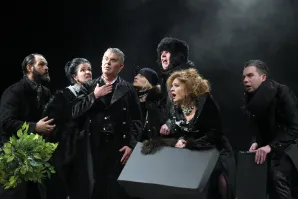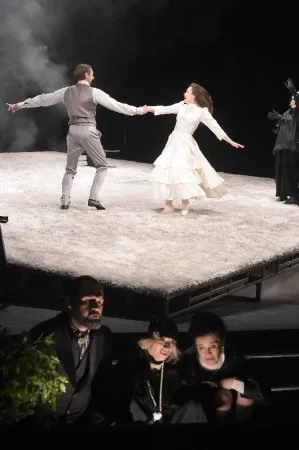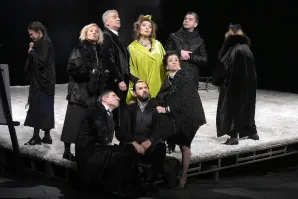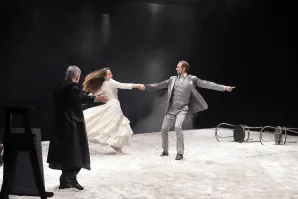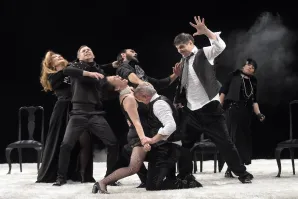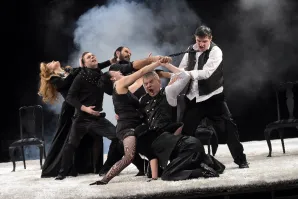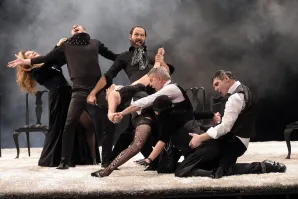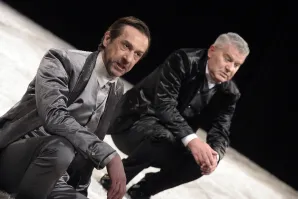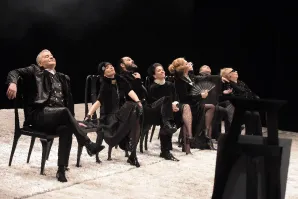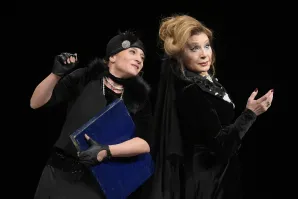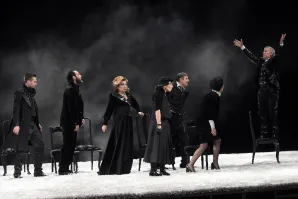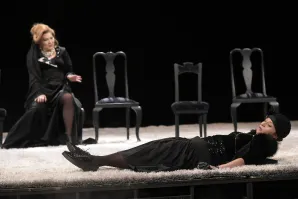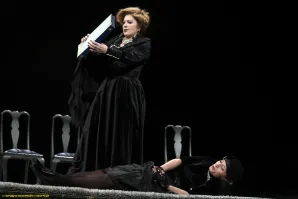The bereaved family
comedy by Branislav Nušić
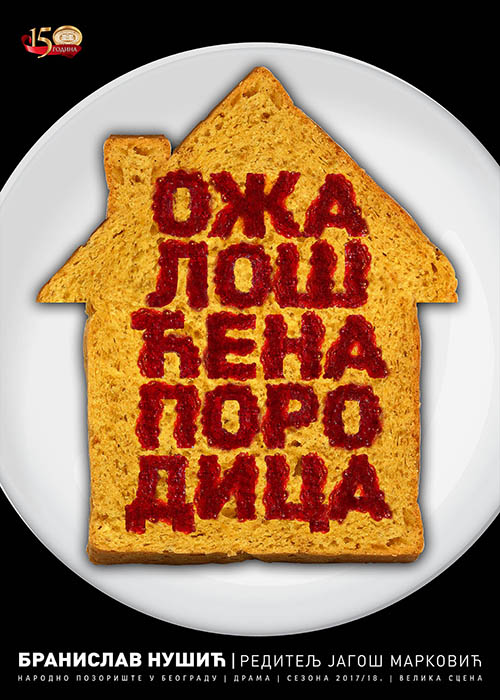
 BRANISLAV NUŠIĆ
BRANISLAV NUŠIĆ
1864 He was born as a fourth child to a well-off family of merchant Djordje Nuša and his wife Ljubica on 8th October in Belgrade. They named him Alkibijad. At the time, they lived in Kralja Petra Street in the house situated exactly where the National Bank of Serbia now stands.
1870 The father is forced to move the family to Smederevo after going bankrupt.
1870–74 He attends elementary school in Smederevo, while his father is keeping a shop.
1874–82 He attends Gymnasium (a grammar school; in 1875 he is forced to repeat the first grade) then he becomes an apprentice for a short time in Pančevo and in 1876 he continues his education in a Gymnasium in Belgrade. Together with his cousin Jevta Ugričić he becomes “infected” with theatre.
1882 He graduates and starts using the name - Branislav.
1883 He becomes acquainted with Vojislav Ilić. The acquaintance is his ticket to the best known centre of literary life in Belgrade at that time – the home of Ilić family, where he shall read his first play Narodni poslanik (A Member of a Parliament).
1884 He studies law in Graz, Austria.
1885. He comes back to Belgrade and continues his studies. Nušić volunteers and fights on Serbian side in a war between Serbia and Bulgaria.
1886 He graduates from law school and writes Pripovetke jednog kaplara (Stories of a Corporal).
1887 He publishes a controversial poem Dva Raba (Two Funerals) and criticizes the rule of King Milan and gets sentenced to two years of imprisonment.
1888 He spends a year in a prison in Požarevac and manages to write Protekcija (Protection).
1889 He becomes a civil servant. The Minister of Foreign Affairs appoints him to consulates in Bitola, Priština, Skopje and Serez. Nušić spends the next ten years in diplomatic service.
1891 Nušić and Dragutin Ilić restart and edit Preodnica (An Advance Party).
1893 Nušić marries Darinka Đorđević, a merchant’s daughter, whom he met as a niece of the Consul Bodi in Bitola. The same year, Nušić is appointed a consul in Priština, where Vojislav Ilić works as his clerk.
1899 He is a member of editorial staff in Zvezda, a magazine run by Janko Veselinović.
1900 Nušić is appointed a Secretary in the Ministry of Education and shortly afterward, he becomes a dramaturge and acting manager of the National Theatre in Belgrade.
1901 He edits Pozorišni list (Theatre News).
1902 Nušić retires as per his own demand, because of his dissatisfaction with not being appointed the manager of National Theatre. He gets reinstated and appointed the commissioner for postal and telephone company, which he refuses and gets re-retired. He takes an active part in establishing the Serbian Writers and Artists Association.
1903 He is appointed the Head of National Propaganda Department with the Government as an authority on situation in Serbian territories still under Turks. After the coup of 29th May, he gets retired yet again.
1904–1905 Nušić is a Manager of Serbian National Theatre in Novi Sad.
1906–1907 He is an assistant dramaturge in the National Theatre in Belgrade.
1905 Nušić and Mihajlo Sretenović establish Malo decje pozoriste (A Small Children’s Theater) in Belgrade (a predecessor of Roda Theatre founded in 1937).
1907 He elaborates a study on foundation of Montenegrin National Theatre in Cetinje for King Nikola.
1905–1910 He publishes his famous “conversations” in the Politika Newspaper and signs them as Ben Akiba.
1910 Nušić is sentenced to three months of imprisonment for his article Narod i dinastija (The People and the Dynasty) commenting on the relationship between King Petar and Prince Đorđe. He does not serve this sentence on account of the upcoming war. He was given a medal of Sveti Sava and White Eagle.
1908–1912 Nušić is involved in journalism. He is an assistant and editor of the following magazines: Samouprava (Self-Management), Tribuna, Belgrade Newspapers, Daily Newspapers, Guard; as well as with humoristic newspapers such as: Brka (Moustaches), Ćosa (Bald), Satire, Telephone, etc.
1912 He is appointed the first Head of liberated Bitola (during the Balkan war).
1913 Nušić establishes a theatre in liberated Skopje and becomes its manager.
1915 Skopje. His daughter Margita Gita gets married to a writer Milivoj Predic; and the son Strahinja Ban dies while fighting with Bačka company. Nušić retreats with the Serbian army through Albania to Corfu.
1916–1917 He lived in Italy, France and Switzerland. He elaborates The Plan to Rebuild and Rejuvenate National Culture after the War and sends it to the Minister of Education to Corfu in 1917.
1918 He goes back to his duty in Skopje.
1919 Nušić becomes the first Head of Art Department (later the Ministry of Culture) in the Ministry of Education in Belgrade
1922 He got denounced by the church, because of his play Nahod.
1923 He is dismissed from position of the Head of Art Department. He received a medal of Sveti Sava I Class.
1924 A grand celebration of his sixtieth birthday and forty years’ writing anniversary.
1925–1928 Nušić becomes a head of Sarajevo Theatre; he writes Ramadan Nights and uses the pseudonym Halil Delibašić.
1929 Nušić is a librarian of the National Assembly. He finally retires. He receives a medal of the Officer of the Legion of Honour.
1930 He acts in a film Paramunt Review in Vienna. He teaches Rhetoric at the Military Academy and writes a book on the subject. The book is still in use.
1931 Nušić signs a contract with a well-known Belgrade publisher, Geza Kohn, regarding the printing of all his works.
1933 He becomes a member of Serbian Royal Academy.
1934 Upon his first major health crisis, he moves with his family to Hvar Island to recuperate.
1935 Upon the premiere of Bereaved Family in Sofia, he gets a Bulgarian medal of Citizen’s Accomplishment.
1936 After many relocations, he purchased a piece of land and built a house in 1 Rosalia Morton str. (now - Shakespeare str.) and moved in on 15th September.
1937 Nušić gets an operation in Vračar Sanatorium in Belgrade. At the founding assembly of Association of Artists, Scientists and Writers, held on 5th December, he gives a speech and appeals to solidarity against fascism – the famous Cultural Testimony.
1938 Branislav Nušić died in Belgrade, on 19th January. He was buried in his family crypt in Novo groblje (New Graveyard) in Belgrade.
 JAGOŠ MARKOVIĆ
JAGOŠ MARKOVIĆ
Jagoš Marković (Podgorica, 1966) is one of the most renowned stage directors in our country and in the region. He graduated from the Faculty of Dramatic Arts in Belgrade (1987) mentored by professors Borjana Prodanović and Svetozar Rapajić. In the National Theatre in Belgrade, where he has been a stage director since 2008, he has directed major works of world and national literature, The Learned Women, Hasan-Aga’s Wife, Mrs. Cabinet Minister’s Wife, The Upstart, PhD, Antigone, Cinderella (opera) and The Marriage of Figaro (opera). As a rule, his productions are very popular, they remain on the repertoire for a long time, receive positive reviews and represent the National Theatre on international tours. Furthermore, Marković has directed over fifty plays in other theatres in the country, as well as abroad. Some of his productions are Romeo and Juliet, Kate Kapuralica, Decameron, a Day Before (National Theatre Sombor), Skup, The Twelfth Night, Telephone Booth, Suspicious Person, The Imaginary Invalid, Right You Are If You Think So (Yugoslav Drama Theatre), Family Stories, The Glembays, Autumn Sonata (Theatre Atelier 212), The Seagull, Filumena Marturano and opera Carmen (CNT Ivan pl. Zajc), Lukrecija o bimo rekli Požeruh (Rijeka Summer Nights), The Learned Women (CNT Split), The Hundred Loop Stocking (Belgrade Drama Theatre), Dawn in the East, Our Sons, Pig’s Father (Zvezdara Theatre), Hasan-Aga’s Wife (Tivat Culture Centre), Tartuffe, Hecuba (Montenegrin National Theatre), etc.
… Marković directed Strindberg’s Queen Christina in the Royal Dramatic Theatre in Sweden for the Theatre’s jubilee. After break-up of Yugoslavia, he was the first stage director from this country who participated in the Dubrovnik Summer Festival (Romeo and Juliet, 2014). As a stage director, Marković won about fifty awards from his peers, as well as festival and state awards, including “Bojan Stupica” Award, Belgrade Liberation Award, “July 13th” Award, “Mića Popović” Award, Award for his overall contribution to art in Montenegro, Award of the City of Belgrade, Award of the City of Podgorica, “Sterija” Awards, several “Zlatni ćuran” and “Ardalion” awards, etc. At the Festival “Balkans Is Reading Jagoš” in Bulgaria, Jagoš Marković’s play The Telephone Booth was staged by several directors. When Ljubomir Simović presented Jagoš the “Mića Popović” Award in June 2004, he said the following about him as an artist, “When staging a play, Jagoš always sees something that no one has seen before. He makes even the old and already known things seem new and unknown. He makes a discrete gesture, but that gesture changes everything… Jagoš changes the metaphors from the original text radically, with great courage. However, he does not do that only as a director, for he is not only a director in the theatre. In fact, he is everything in the theatre: he is an actor and a whole ensemble, he is the audience, the stage and the theatre box, the first, the second and the third gallery, he is the theatre library, he is the brush and the paint, the hammer and the nail, the ropes and the lights, the silk and the fire, the sets and the curtain. He is all of that probably to show us that the world without love is only a dry, salty and barren sea floor, which is what Apostle Paul says about love in The First Epistle to the Corinthians.”
Premiere performance
Premiere January 19, 2018. / Main stage
Directing, adaptation and selection of music Jagoš Marković
Dramaturge Molina Udovički Fotez
Stage speech Ljiljana Mrkić Popović
Set Designer Matija Vučićević
Costume Designer Maria Marković Milojev
Sound Designer Vladimir Petričević
Assistant Stage Director and Adaptation Tara Lazarević
Executive Producer Vuk Miletić
Producer Jasmina Urošević
Premiere Cast:
Agaton Arsić Saša Torlaković
Simka Radmila Živković
Sarka Danica Maksimović
Proka Purić Nebojša Dugalić
Gina Vanja Ejdus
Tanasije Dimitrijević Aleksandar Srećković
Vida Nela Mihailović
DR. Petrović, Lawyer Slobodan Beštić
Danica Suzana Lukić
Mića Dušan Matejić
Assistant Stage Director Ksenija Ćirica
Stage Manager Saša Tanasković
Prompter Dušanka Vukić
Assistant Costume Designer Ana Konjović
Light Operater Miodrag Milivojević
Make-up Marko Dukić
Stage Crew Chiefs Branko Perišić, Zoran Mirić
Sound Operater Perica Ćurković
Sets and costumes were manufactured in the National Theatre Workshops

